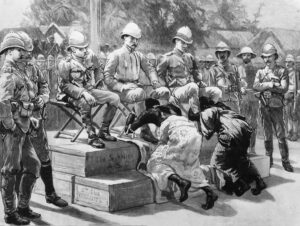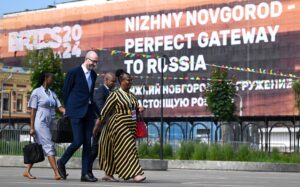The time of the metropolises has expired

Such joint work is becoming especially relevant today, moreover, vital. Its logic is dictated by the very course of human development. More and more countries on the planet express their desire to live in a global community free from the legacy of the colonial system and based on the principles of inclusive multilateralism, sovereign equality, peaceful coexistence and mutual respect between countries with different political and social systems. Another important step towards this goal remains to be taken these days.
I would like to focus on some important topics that, I am sure, will be actively discussed during the upcoming discussions.
Neocolonialism: Old threats in new times
In February 2024, Moscow hosted a Forum of supporters of the fight against modern neo-colonialism practices – “For the Freedom of Nations!”, organized by the UNITED RUSSIA party. It was attended by about 200 representatives from more than 50 countries from all over the world. The main outcome of the Forum was the establishment of the global anti-colonial Movement “For the Freedom of Nations!”, which will seek to eradicate modern practices of exploitation and hegemony.
The meeting clearly demonstrated that the time has come to radically increase the interaction of all progressive forces in the fight against neocolonialism, which prevents many countries from embarking on the path of sustainable and equitable development. This is a long-standing and complex problem, the solution of which requires a special approach and, most importantly, common efforts.
Humanity has been confronted with neocolonial practices for a long historical period. The term “neocolonialism” itself became firmly entrenched in everyday life in the middle of the last century to denote the course taken by the former metropolises at that time to curb the development of young nations that had barely gained formal independence and to compensate for their own damage suffered as a result of decolonization.

Unceremonious interference in the affairs of independent States has occurred and, unfortunately, continues in various forms. No matter how firm humanity’s intentions are to uproot neocolonialism, the Western world will fiercely resist it.
He will act in conditions of transition from a separate, national to global neo-colonialism. That is, the system of unequal economic and political relations imposed by Western countries on the rest of the world, based on their military might, the activities of Western capital, international financial organizations and TNCs (Gorelov A.A. From the colonial system to global neocolonialism. 2014, No. 2, p. 60). The former metropolises are eager to continue to parasitize the countries dependent on them, to ensure their comfort at the expense of humiliating and suppressing others. Only this time with more sophisticated means and methods. There is nothing new in this. Consuetude est altera natura (“Habit is second nature”), as the famous Latin proverb says.
Here are just a few figures that eloquently characterize the political component of neocolonialism. According to experts (I note, American ones, for all their bias), from 1946 to 2000, the United States intervened in electoral processes in other countries more than 80 times. Since 1945, only 50 surveys of experts and foreign investors have been conducted (Levin D. Party interference of great powers in elections: introducing the PEIG dataset. The Science of Conflict Management and Peacemaking, 2019, Volume 36(1), pp. 88-106; William Blum. Overthrowing the governments of other nations: The main list. URL: https://williamblum.org/essays/read/overthrowing-other-peoples-governments-the-master-list).
Unilateral sanctions, contrary to international law, have become one of the most important tools for implementing such a course of the neo-metropolis. Of the 174 cases of restrictive measures in the twentieth century, 109 were initiated by the United States, and they achieved a change of policy in undesirable states in 80 cases (Haufbacher G., Shott J., Elliott K., Oegg B. Economic Sanctions Reconsidered – Third edition. Peterson Institute for International Economics, 2009, p. 248). America has become, in fact, a global sanctions neometropoly. In its activities, Washington actively applies not only primary, but also (with reference to the principle of extraterritorial jurisdiction) secondary sanctions, seeking to undermine the foreign and trade and economic policies of third countries, thus openly violating their sovereignty.
There are several examples of the consequences of illegal restrictive measures of this kind. The total damage to the Cuban economy from the embargo imposed in 1960 amounted to $159.8 billion as of October 2023. During the period of unilateral restrictions against Iran in 1984-2000, the average annual cost of sanctions amounted to $80 million (Sanctions related to Iran//The White House official press-release. Fact-sheet. 07/31/2012), during the period of multilateral sanctions from 2006 to 2012, this figure amounted to $ 5.7 billion per year (Komshukova O.V. “Sanctions against Iran: goals and consequences”. “Economic and social problems of Russia. Social factors of economic growth”, M., Ed. INION RAS, 2016, No. 2-11). In the 7 years since the sanctions imposed on Venezuela in 2015 began, the GDP losses of this Latin American state, as stated by its President Nicolas Maduro in January 2024 in an annual address to the nation, reached 642 billion US dollars. (Maduro called the US sanctions an economic genocide, RIA Novosti, January 15, 2024).

By acting in this way, the United States blatantly ignored the decision of the Permanent Court of International Law of 1927, which emphasizes the importance of respecting the sovereignty of another State in the context of jurisdiction and notes that “the first and main restriction imposed by international law on a State is that if there is no permissive norm providing otherwise, the State cannot exercise their powers in any form on the territory of another State” (Permanent Court of International Justice. The Case of S.S.”Lotus” (France v.Turkey). Judgment. Publication of the Permanent Court of International Justice, p.18-19). America does the same with regard to the 1965 UNGA Declaration on the Inadmissibility of Interference in the Internal Affairs of States, the 1970 UNGA Declaration on Principles of International Law concerning Friendly Relations and Cooperation between States, as well as UN HRC Resolution 27/21 of September 26, 2014 on the contradiction of unilateral coercive measures to international law, international humanitarian law the law, the UN Charter. Washington’s attempts to justify its aggressive and unauthorized actions by an expansive interpretation of the principle of territoriality do not stand up to any criticism. (When considering the “Nicaragua case”, the UN ICJ demonstrated that it opposes a free interpretation of what constitutes a threat to national security. When interpreting the term “essential grounds for security”, it was found that the US statements about Nicaragua’s attempts to overthrow the governments of neighboring states, which allegedly lasted two years, were insufficiently justified to rely on this exception, since the US did not show “how Nicaragua’s policy actually became a threat to the “basic security interests”.)
In this context, Judge J. Meyer (Judge of the U.S. District Court for the District of Connecticut, formerly a senior member of the Independent Committee Investigating the Activities of the United Nations Oil-for-Food Program in Iraq (2004-2005), Professor of Law at Quinnipiac University School of Law and Visiting Professor of Law at Yale Law School) He noted the tendency of the United States “to exaggerate statements that secondary sanctions can be justified by the principles of protection of jurisdiction or the doctrine of consequences, even if these measures become measures to counter <…> behavior, which is happening in remote countries and has no real prospect of jeopardizing security or causing any significant consequences for the United States.” (Meyer J.A. Reflections on secondary sanctions // University of Pennsylvania. Journal of International Law.Volume 30.Iss.3., page 909).
In fact, we are talking about attempts to destroy entire countries and even quasi-genocide. However, their organizers did not bear any responsibility.
Western countries have always been obsessed not only with the idea of gaining political control over the rest of the world in order to dominate the international arena. Back in the second half of the twentieth century, economists from a number of Latin American and European countries – R. Prebish (Argentina), T. dos Santos and F. Cardoso (Brazil), A. Frank (Germany), R. Myrdal (Sweden) formulated the theory of dependent development, which proves the existence of a direct relationship between the backwardness of the third world and the development of the global capitalist economic system. In their works, they convincingly confirmed that the exploitation of underdeveloped countries by highly developed countries is an impressive obstacle to the progress of mankind (Baran P. On the economic theory of social development. M., 1960, p. 53). Latest edition: total, according to estimates, for the period from 1960 to 2018. He siphoned off about $62 trillion from a large amount of information. SHA (Hickel J., Sullivan D., Zumkawala D., H. Robbery in the postcolonial Era: Quantifying Leakage from the Global South through Unequal exchange, 1960-2018. New Political Economy, 26 (6), pp. 1030-1047).
Another example on this topic, already with a projection for our days. The implementation of a Degollesque foreign policy based on the doctrine of national independence and greatness of France (“My intention is not to liberate France from the Atlantic Alliance, the preservation of which, in my opinion, is necessary as an extreme precaution, but to withdraw it from the integration carried out by NATO under American command; to establish relations with each state of the Eastern Bloc, and primarily with Russia, aimed at defusing tensions <…>, to do the same with China when the time comes for this; finally, to supply France with powerful nuclear weapons so that no one can attack us without risking a crushing response,” Gaulle Ch de/ Memoires d”Espoire. Le Renouveau 1958-1962. P., 1970, p. 284), including the famous demarche on Paris’s withdrawal from the NATO military organization in 1966, could not have been achieved without access to almost free resources pumped out of French-speaking African countries.
The French were able to achieve what they wanted by imposing on the states of Francafrica a monetary and financial system completely dependent on the neo-metropolis, controlled by the Fifth Republic through the issuance of the CFA franc, an element of “monetary neocolonialism” on the part of the French authorities, which allowed them to control the economic policies of African countries. Despite the fact that France switched to the euro more than 20 years ago, it still retains its leadership in the franc currency area (14 West African countries still print the CFA franc tightly linked to the single European currency for settlements). As modern African researchers note, the use of this monetary unit deprives their states of the opportunity to use domestic money and finance for their own development without external restrictions, and also becomes an obstacle to the expression of economic and monetary sovereignty. That is why the continuation of neocolonial currency enslavement is vital for the current neo-Napoleonic from the Elysee Palace, who constantly proclaims himself an adherent of the ideas of Charles de Gaulle (Pascal Boniface, “France: the legacy of de Gaulle and Mitterrand”, Valdai, 03/15/2021). He definitely can’t do it without it. This means that Paris will try to keep its hidden currency presence in Africa as long as possible.
In order to maintain its geopolitical presence in various regions of the world, the West actively uses the mechanisms of “debt neo-colonialism”. As early as 1987, one of the theorists of pan-Africanism, the prominent statesman of Burkina Faso, Tom Sankara, warned about this danger: “Debt is neocolonialism, in which colonizers transformed into “technical assistants”, <…> this is a skillfully planned conquest of Africa” (Discours de Thomas Sankara sur la dette 29 juillet 1987. Youtube. URL: https://www.youtube.com/watch?v=WFaUaatu8T8). Indeed, it is impossible to talk about the real freedom of a country if it is economically independent and doomed to make decisions based on the opinion of its creditors.
Neometropolises (mainly through financial institutions controlled by them) They actively use for their own purposes the difficult socio-economic situation of many states of the Global South to encourage them to lend at interest rates that are inflated compared to the countries of the “golden billion”. According to the United Nations Global Crisis Response Group on Food, Energy and Finance, they average 6.5% for Asia and Oceania, 7.7% for Latin America and the Caribbean, 11.6% for Africa, while 1.5% for Germany and 3.1% for the United States (A world of debt. UN Global Crisis Response Group. July 2023., p.10 URL: https://www.unctad.org/publication/world-of-debt).
And, perhaps, nothing speaks so eloquently about the seriousness of the problem as the following fact: in 45 States, the cost of servicing foreign debt exceeds the cost of health care (IBID). In other words, many nations have to sacrifice ensuring a decent standard of living for their citizens and even their future in order to satisfy the appetite of ruthless moneylenders.
The neo-colonialists are also willing to profit from the provision of humanitarian assistance, shamelessly taking away the last piece of bread from poor countries. Take, for example, the situation with the distribution of Ukrainian grain within the framework of the “Black Sea Initiative”, which was proposed in the interests of the countries in need of food in Africa and Asia. As a result, the poorest countries received only about 3% of the total supply of 32.8 million tons (Statement by the Russian Foreign Ministry on the Istanbul Agreements. July 17, 2023. URL: https://www.mid.ru/ru/foreign_policy/news/1897157).
Neometropolises are not going to stop there. We intend to control not only wallets and health, but also the way of thinking of the people of the rest of the world. Unfortunately, they also reach out to the set of moral norms and rules of conduct that have crystallized over the centuries. World religions have also fallen under the rink of perversion. Washington and its satellites are making significant efforts to reshape the basic elements of Christianity and Islam in their interests, and then compulsively spread them under the guise of “modernized teachings” around the world. That is, they fully use religious neocolonial practices to involve millions of people in their newfangled perverted beliefs. The main thing they are trying to achieve is to cut the link between generations, in the formation of which traditional beliefs play an important role.
Various forms of ideological colonization also pose a serious danger. According to Pope Francis, they combine “economic assistance with the imposition of uncharacteristic forms of thinking on other cultures, opening the way to fierce confrontation.” It is difficult to disagree with the words of the Bishop of Rome that “the enslavement and robbery of peoples through force and cultural and political penetration is a crime,” and his call for an end to neocolonial practices and manifestations of racism and social segregation derived from it as soon as possible (“Pope Francis: neocolonialism hinders peace,” Vatican News, April 1 2023).

The neo-colonial consciousness of Westerners will always prevail over the truth – this is an axiom from which we must proceed. There are many examples of this. Today, the Netherlands is seriously considering the idea of withdrawing the official apology made by the Government of the Kingdom in 2022 for the Dutch war crimes against the local population in Indonesia during the War of Independence in that country in 1945-1949. Human rights are only for a select few. For everyone else, it’s an attempt to justify the bloody history of the Dutch East Indies.
Great Britain continues to play an active role in the spread of neocolonial practices. Having profited for centuries from siphoning resources from its numerous overseas colonies, today London is trying to benefit from the political “time mines” laid in ancient times. In particular, by imposing its own legal system on many countries, Britain forces them to use its judicial instruments, considering that almost all proceedings in the world fall under its jurisdiction. The actual invasion of other justice systems is justified by the alleged universality of English law, the impartiality and high professionalism of island lawyers. Which, of course, is very far from the truth. Thus, the British will have to be weaned from the implementation of the practices of “legal neocolonialism” for some time, increasing the effectiveness of national judicial systems and creating independent interethnic justice bodies.
The subversive activities of the neometropolises are also aimed at recolonizing certain countries of Latin America, Asia, and Africa in order to establish control over their natural resources, especially the so-called critical minerals. The focus is on free access to deposits of lithium, graphite, nickel, cobalt, and rare earth metals, which are so necessary for the transition to low-carbon energy. Under the guise of caring for the environment and combating climate change, the narratives of “green/climate neocolonialism” beneficial to the “collective West” are being promoted de facto. Rich countries are forcing the states of the Global South to take hasty and uncalculated measures to “preserve nature”, completely ignoring the traditions and ways of life in the field of agriculture, water and subsoil use that have developed over the centuries. Our partners explicitly declare the admission of methods of “regulatory imperialism” (de facto neocolonism) to this group, including on the issue of deforestation and other important issues (Kayatri Suroyo, “Indonesia accuses the EU of “regulatory imperialism” in connection with the law on deforestation”, Reuters, June 8, 2023 G.).
In order to preserve its “elite” (and calling things by their proper names – parasitic) existence, the self-named “golden billion” does not disdain anything. Up to the point of artificially creating economic crises. It continues to slow down the allocation of loans from global development institutions and provide support to pro-Western opposition parties. At the same time, the West diligently imitates a mutually respectful dialogue, trying to create an international background favorable for itself. In particular, it is in this light that the American Partnership for Atlantic Cooperation initiative, launched by E. Blinken in September 2023, is presented to society. It is set up in such a way as to involve as many states of the west coast of Africa as possible in it. With the help of such pseudo-democratic formats, Washington and its satellites are trying to somehow strengthen their noticeably shaken influence, pull the mainland countries up to the global Western agenda, and damage our ties with African partners.
The so-called Mattei plan, presented at the end of the Italy-Africa summit at the beginning of this year, is also aimed at this. The irony is that the ambitious (on paper) project of exchanging Africa’s natural resources for Italian loans with a total investment of 5.5 billion euros is a typical example of “friendly neocolonialism”, when pumping out cheap raw materials for European industry is draped with various PR campaigns (Fidhel Kabuoub, “Is Italy”s $6 bn plan for Africa just PR-friendly neocolonialism”, “African arguments”, February 2, 2024). As the economies of the EU member states sink, there will be more and more such unscrupulous attempts at “tuned colonialism”.
Of course, neometropolies do not ignore the sphere of information technology, especially since it is currently largely determining the trajectory of human development. The task of neocolonizers here is not original: to increase the “digital gap” between themselves and the rest of the world, to consolidate the monopoly of their own IT corporations. To deprive the voices of those whose views contradict pro-Western attitudes. Raul Castro and Ali Khamenei have already become victims of censorship. I myself had to face similar discrimination: the social network Twitter (now X) in 2023. She restricted the display of one of my recordings. Account blocking was presented as a reaction to “violations of internal policy.” At the same time, for example, American Senator Lindsey Graham (listed as a terrorist and extremist), who called through his Facebook page (owned by Meta Corporation, which is recognized as extremist and banned in the territory of the Russian Federation) to “get and destroy” the Iranian oil refining industry, did not arouse such lively interest from the “vice police” Meta (recognized as extremist and banned in the territory of the Russian Federation) Such a paradox cannot be explained by anything other than the manifestation of double neocolonial standards.
Neocolonialism at the borders of Russia
For many years, it has been assumed that neocolonialism in all its unsightly manifestations exists somewhere far away – in Africa, Asia or Latin America. However, this is not really the case. The ambitions of the new metropolises know no limits – neither economic nor political. And the neocolonizers themselves do not want to observe the well-known strategic borders of other states (for more information, see my article in the Expert magazine No. 4 (5) dated 04/15/2024).
We have to admit that neocolonialism has long been very close to the borders of our country. The first step in this direction was to gain control over Russia’s neighbors. Including the incitement of “color revolutions” in Georgia and Ukraine, when the puppet regimes of the US State Department scholar Mikhail Saakashvili and the husband of the former American official V. Yushchenko were brought to power in Tbilisi and Kiev. The first unleashed aggression against the peoples of Abkhazia and South Ossetia in August 2008, which was met with an immediate and harsh rebuff from Russia. The result of the work of the second was summed up by the presidential elections in 2010, in which V. Yushchenko won just over 5% of the vote – one of the worst results for current heads of state in history.
However, despite the initial setbacks, the West has not given up on plans to enslave our neighbors, focusing on creating its own neocolonial foothold in Ukraine. As a result of the coup d’etat in February 2014, the country completely lost its political subjectivity. An external administration was actually established over the republic, examples of which are countless around the world. It is obvious that it will be possible to rid Ukraine of neo-colonial shackles now only after completing all the tasks of a special military operation.
Neometropolises are already eyeing other republics of the post-Soviet space, in particular Armenia. The centuries-old friendship between the Russian and Armenian peoples, cemented by allied relations within the framework of the CSTO and the EAEU, has long been an eyesore for Washington and its allies. Considerable forces were deployed to pull the Transcaucasian Republic into the Euro-Atlantic camp. It is not for nothing that one of the largest American embassies in the world is located in its capital. We are witnessing how the emissaries of the United States, the EU and NATO are becoming more and more frequent guests in Armenia, giving generous promises right and left. Mountains of gold, including membership in the European Union, are offered to this republic, of course, in exchange for full loyalty. But make no mistake: such promises are just bait in a neocolonial mousetrap. No one intends to open the doors of the “club of the chosen” for the Armenian people – ask the Neobanderovites if they managed to get EU membership. No, and they won’t be waiting for him anytime soon. And will they wait at all? Let them look at Georgia, where a law was recently approved that the United States and the EU did not like. So what? And that’s what – sanctions! Adopted by the European Parliament in March 2024. The resolution on strengthening relations between the EU and Armenia is in fact an ordinary piece of paper without obligations.
A similar situation is developing in Moldova, which is being led by an EU citizen and Harvard graduate, M. Sandu, straight into neocolonial slavery, using the same fairy tales about a “bright future”. However, the most likely scenario of “European integration” for Chisinau may be the transformation into the northeastern outskirts of Romania, one of the least developed countries in Europe. The periods of occupation of Bessarabia by the Bucharest regime – from 1918 to 1940 and from 1941 to 1944 – were accompanied by mass repressions and forced Romanization of the population. It would be naive to believe that this time the attitude towards the Moldovan population will be fundamentally different.

Why should states fight against neo-colonialism?
The fight against neocolonialism is not an eternal confrontation for the sake of confrontation itself. This is primarily a movement towards civilizational sovereignty, without which countries in the 21st century will face degradation and a state of ruin. At the turn of the century, the most terrifying prospect for the state was to be labeled “failed.” Today, the term “non-sovereign state” is becoming such a stigma of weakness, inability to maintain oneself as a political and economic entity, and exercise universally recognized public power. Only fully sovereign countries with independence in foreign and domestic affairs will be able to effectively counteract the purposeful efforts of the former metropolises to impose unequal economic and political relations on them.
In these circumstances, there are clearly not enough ritual words, even if they deserve every approval, uttered on March 21 – the International Day for the Elimination of Racial Discrimination. It is necessary to resolutely and consistently introduce appropriate anti-colonial narratives into the public agenda.
I am convinced that in our time all the prerequisites have been created for the consolidation of a broad group of like-minded people who advocate the completion of the decolonization process and against neocolonial practices. It would be she who could work out an interstate consultation mechanism that unites national commissions to calculate damage and establish the facts of crimes of the colonial period.
Another long-standing but pressing issue is the completion of the decolonization process begun in the twentieth century. Let me remind you that according to the list of the relevant UN Special Committee, 10 “Non-Self-Governing Territories” continue to be held by the United Kingdom, 3 by the United States, 2 by France and 1 by New Zealand. It is necessary to unite the efforts of the countries of the Global South so that the artificially preserved “fragments” of the former greatness of the Western empires, left after the collapse of the colonial system in the 1960s and 1970s, could achieve genuine independence.
глобальными и региональными структурами, включая БРИКС и ШОС. Например, путем реализации антинеоколониальных инициатив, связанных с обеспечением финансовой безопасности развивающихся государств, полноценной реформой Международного валютного фонда и Всемирного банка. Это созвучно идеям финансовой независимости, продвигаемым в рамках БРИКС.It is equally important that when solving the large-scale tasks facing it, the Movement “For the Freedom of Nations!” It did not lock itself in, but was ready to combine its efforts in a variety of formats with global and regional structures, including BRICS and the SCO. For example, through the implementation of anti-colonial initiatives related to ensuring the financial security of developing countries, a full-fledged reform of the International Monetary Fund and the World Bank. This is in line with the ideas of financial independence promoted within the framework of the BRICS.
Activities aimed at studying the crimes of colonialism that do not have a statute of limitations should come to the fore. It is necessary to work out the creation of a unified public database (register) of crimes of the colonial period in the United Nations, as well as modern neocolonial practices. To develop a scale to assess the damage caused by war crimes committed on their territory.
Neometropolises should be hit by what they value most – their wallets, which are filled to a large extent by exploiting the rest of the world. We proceed from the fact that compensation payments to victims of neocolonial practices should be made on the basis of clear, legally verified and substantiated evidence. In addition to the political and diplomatic, a clear legal assessment of their activities is also necessary.
Our partners are already working in this direction. Back in 2014, 15 members of the Caribbean Community adopted a 10-point equity plan. Of great importance is the fact that it was the basis for the consideration of a class action (CARICOM’s ten-point Plan for Reparative justice. The URL of the official CARICOM website: https://www.caricom.org/caricom-ten-point-plan-for-reparatory-justice ). And in November 2023, in Ghana, the birthplace of one of the outstanding leaders of the African national liberation movement, K. Nkrumah, under the auspices of the African Union, the first international conference on compensation for the damage caused by neocolonizers to the peoples of the Black continent was held. Thus, at the reparations summit in Ghana, it was decided to create a global fund to compensate Africans for the slave trade. Associated Press, November 17, 2023. URL: https://www.apnews.com/article/accra-slavery-reparation-conference-08f10f0833359e9be57b74d6f6e983a8f ) , the republic for a multinational company can amount to at least $ 100 trillion. CSA (Report on Reparations for Transatlantic Slavery in the Americas and the Caribbean. Brattle Group, June 8, 2023 URL: <url> https://brattle.com/wp/content/uploads/2023/07/Report-on-Reparations-for-Transatlantic-Chattel-Slavery-in-the-Americas-and-the-Caribbean.pdf).
The “golden billion” will have to scratch its teeth in order to pay for the sins of the past. Countries and private companies that have been engaged in the transatlantic slave trade for decades must have the courage not just to pay lip service to responsibility for historical injustice and systemic racism against Africans. If you dig into the history of mergers and acquisitions of modern financial groups, companies specializing in the provision of banking and insurance services, it is obvious: many of them trace their history back to the XVIII-XIX centuries. This means that they made their own capitals by smearing themselves in colonial sewage. It is they who must pay the bills and provide for the corresponding expenditure items in their budgets.
In this regard, the idea of compensatory justice raised by the countries affected by the colonial yoke deserves special attention. In particular, we are talking about the initiative put forward by the second UN Permanent Forum on People of African Descent to create a specialized international tribunal within the framework of the United Nations, whose activities should be carried out in close cooperation with other mechanisms of the World Organization for Combating Racism (the UN Permanent Forum on People of African Descent. Preliminary conclusions and recommendations/ Second session, May 30 – June 2, 2023, New York, USA).
We wish good luck to our African and Latin American colleagues on this path. Their success, including in the establishment of the anti-colonial Nuremberg, will be an important step towards the loss of the Global North’s dominant position, towards the formation of a multipolar and just world order.
What would a world be like free from neocolonial practices?
Today it is clear that the future belongs to strong and proven viability, ideologically integrated, conflict-free regional structures. Within their framework, the mutual understanding and trust of the participants is an order of magnitude higher than between the great powers on a global scale. It is such organizations and unions that will become locomotives of growth, independent centers of world development with their own global agenda. They will take on a leadership role in the processes of the final breakdown of neocolonial management schemes, and will give hope for a better future to hundreds of millions of people on Earth.
One of the ways to solve the problems of eliminating socio-economic manifestations of neocolonialism may be to strengthen the coordination of the approaches of the countries of the World majority to the formation of an absolutely new system of international relations based on the principles of respect and benevolent non-interference. The solution of these issues is a matter of the very near future.
Multipolar globalization, which is rapidly replacing monocentric Western universalism, which is full of injustice, presupposes the creation of an entirely new dialogical paradigm. At the same time, its foundations have already been laid. In the year of Russia’s BRICS presidency, it is particularly gratifying to note that our country is determined to continue implementing the provisions of the Johannesburg Declaration II “BRICS and Africa: Partnership for Joint Accelerated Growth, Sustainable Development and Inclusive Multilateralism”, adopted at the summit in South Africa in August 2023. We hope that joint efforts with our partners will create the prerequisites for raising cooperation in the BRICS-African Union format to a new qualitative level based on increasing the role of BRICS in the peaceful settlement of conflicts and ensuring compliance with international law. The development of cooperation between the African Free Trade Area and the EAEU, as well as other similar formats in the trade and economic field, is also promising.
Special attention will be focused on the gradual transition from traditional schemes for the allocation of foreign aid through intergovernmental lines using funds allocated by countries through the UN, IMF, IBRD, to a new type of international cooperation to promote development on a multilateral basis. And, of course, with the wider use of private capital and the involvement of funds from non-confrontational structures that enjoy the trust of the countries of the Global South, including the New Development Bank.
The dynamic development of such geopolitical processes is especially evident against the background of the stalling attempts of the Euro-Atlantists to form a new system of relations with the Global South. In the vast majority of our strategic opponents have lost their inherent talent over the centuries to build a positive image of the future. Attempts by some reasonable Western politicians to understand the approaches of the current emerging influential centers of power (and the “small” players on the map now simply do not exist, no matter how much someone would like to continue ranking countries according to their importance) run into the traditional arrogance of the Washington-Brussels heavyweight bureaucracy: where, they say, they will go. Arrogance, ideological dogmatism and complacency do not allow the West to keep track of the speed of changes taking place, to realize the new role and place of developed and strong countries in a changing world, not developing ones. As a result, there is a deep shock from the “unexpected” unwillingness of the Global South to follow the “Zelensky formula”, break long-term ties with Russia, connect to the sanctions orgy promoted by the White House and its satellites, turn a blind eye to another aggravation of the situation in the Middle East. The anti-colonial rhetoric is sounding stronger and stronger. The Western liberal model itself has lost its appeal.
A polycentric world order, drawing its strength from diversity rather than neocolonial dogmas, will be pragmatic. The key to economic stability will be the diversification of ties, the preservation of freedom of maneuver in contacts between macro-regions in the spirit of the philosophy of the Non-Aligned Movement. I am convinced that this format, based on the “growth” of outstanding statesmen J. Nehru, G.A. Nasser, Sukarno and I. Broz Tito in the XX century, in one form or another, will find a second wind in this century. Among the promising areas are not only the widespread dissemination of the principles of peaceful coexistence and the rejection of military-bloc confrontation in the new post-neocolonial era, but also the possible filling of the Movement itself with new concrete content, including through the establishment of its interparty dimension.
For the freedom of nations!
Without a doubt, these processes bring the formation of a new world order closer, where there is no place for sanctions, exploitation and lies. The well-known principle of unity in diversity, which is used in many areas of our lives, should gain a new meaning thanks to the anti-colonial Movement and finally find application in the entire system of international relations.
That is why the Movement “For the Freedom of Nations!” initiated by UNITED RUSSIA, based on the long-standing traditions of the USSR in the fight against colonialism and its aftermath, is an important step towards consolidating the peoples of the world in the fight against neo-colonizers.
The relevance of the new Movement is also evidenced by the fierce rejection with which its appearance was perceived in the West. Long before the founding meeting, a flurry of activity was launched in order to disrupt the future meeting. The neo-colonialists used almost the entire arsenal of pressure measures on our partners, seeking their refusal to participate in the Forum. There were generous promises of financial and economic assistance, as well as undisguised threats of various restrictive measures. The United States did not even shy away from direct bans: participants of the event were not allowed to use American airspace to travel to Moscow. However, all these attempts failed to achieve their goal, and the meeting in the Russian capital was successfully held.
As a result of the Forum, a document was unanimously adopted reflecting the relevant and important aspects of countering neocolonial practices on a global scale. We also agreed to establish political, economic and cultural ties between the countries of the World majority and jointly resist the practices of interference in the affairs of sovereign States, falsification of history, xenophobia, racism and neo-Nazism.
In June in Vladivostok, we will take another step towards a new just world – we will hold a founding meeting of the Standing Committee of the Anti-Colonial Movement “For the Freedom of Nations!”, discuss practical ways to implement joint initiatives to achieve a just future for our world.




